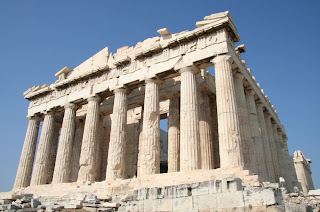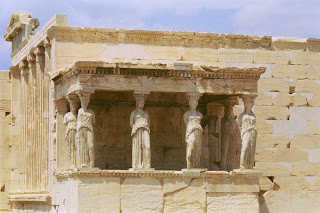Roman Civilization
Background
Before the decline of the Greek civilization, another great empire and civilization emergedon the banks of the Tiber River in Italy. This civilization was known as the roman civilization as it centered around the city of Rome. In the earlier days Rome was under the rule of one king. There was both senate and council. In 510 B.C, when the king became a tyrant he was dethroned and a republic was established. The Roman civilization sustained for nearly 600 years.
Geographic Location and Time Frame
Rome is situated in western part of central Italy. Italy is a country of the European continent that expanded from the Mediterranean in the south of Italy to the Alps in the north. The Adriatic Sea is between Italy and Yugoslavia. On the beaches of the Adriatic Sea, in the north-eastern side of Italy is the ancient sea port, Adria. The Mediterranean is also in the western side of Italy. This part of the sea was known in the ancient times as the Etruscan sea. Rome was an agriculture based city because of its favorable agricultural conditions. As a result of this the frequent conflict between the inhabitants and the invaders were a common scene in Rome. These conflicts turned the Roman nation into expert soldiers. If we analyze the history of Rome we will see that through all the ups and downs, the conflict and struggle eventually Rome was established in 753 B.C. In 476 B.C the Roman nation finally saw its end in the hands of the barbarous German nations.Rome and the Roman rule
The city of Rome is situated on the top of seven mountains,twelve to thirteen miles away from the origin spot of the river Tiber, which is a very significant geographical spot. And so this city is known as the city of seven mountains. In 2000 B.C a group of people who belonged to the Indo-European family started to live in Italy. They were the Latinos. Their language 'Latin' is named after them as well. The Latin King Romulus founded the city of Rome. The city is named after him. Rome did not become a democratic country in a day. Step by step, through many struggle and conflict Rome came to be a democratic state. The historians divided Rome into particular phases. For example, from 753-510 B.C was called the period of kingdom. In this period seven kings ruled over the country. In this period the last emperor Tarquiniussupercus was overthrown and the republican began. The republican system sustained from 500 B.C to 60 B.C. As the Republican system emerged, the people of Rome nominated their revolutionary leader Brutus and another man as representatives of the state. After the fall of the Monarchy the people of the state were divided into two groups. They were the Patricians, who were the aristocrats and the plebeians, who were the citizen commoners. Small farmers, craftsman, traders were members of the plebeian group. In the first two hundred years of the republican state was the history of warfare between the patricians and the plebeians. The plebeians were the deprived group. They continually revolted for their rights. In 450 B.C the Plebeians wrote 12 laws on a bronze plate. As a final victory of the revolution one member from the two plebeian counselors were selected to stand for election. Thus the Roman Republic headed for a democratic transformation. Although Rome was a republican state, it gradually emerged as an imperialist power. In a very short time Rome was able to create dominance over entire Italy. Form 146 B.C to 46 B.C the Roman Empire underwent a Dark Age. Rome became agitated and conflicted with the frequent power struggle between rich and poor, revolutions of the slaves and violence and bloodshed for power. The Roman economy depended on the slaves. The slaves were no longer able to tolerate the inhuman torture on them and announced mutiny under the leadership of Spartacus. They were able to continue their revolt for two years. After the murder of Spartacus in 71 B.C the mutiny finally came to an end. Insufferable torture and misery came down upon the salves. Apart from the internal conflict Rome became involved in a bloody war. As a resultthe ambitious generals took over the power and civil war spread in the entire country. At one stage of the power struggle three captains came to power in a mutual understanding. The large Roman Empire was divided into three parts and the three generals: Octavious Caesar, Mark Anthony and Lepidus took over the rule which was known as the triumvirate.The ruler of the African Provinces was Lepidus; ruler of the Italian Empire was Octavious Caesar. However, the triumvirate did not work for long, because the three had the ambition to become the one and only ruler of the Roman Empire. Consequently, in a short time the power struggle began again. Octavian Caesar defeated Lepidus, and Mark Anthony increased his force by marrying the princess of Egypt Cleopatra. But in the end he was defeated by Octavious Caesar in the power struggle. Octavious Ceasar came to power and took the name Augustus Caesar. He is known in history by this very name. Augustus Caesar died in 14 AD. The most significant incident of his time is the birth of Jesus Christ. After the death of Augustus Caesar, Rome again fell into conflict and chaos. The foreign invasion particularly the frequent attacks of the Germanic tribes were become more and more catastrophic. Apart from that the internal conflict in Rome gradually weakened the entire country. Rome finally fell in 476 B.C as the last Roman emperor Romulus Augustulus failed to defend the empire from the attack of the barbarous Germanic tribes. In the mean time Christianity prospered and the Germanic tribes emerged.Contribution of Rome to Civilization
Rome was influenced by the Greeks in art, literature, philosophy and architecture. They have imitated and followed the Greeks in these aspects. However, they achieved superiority over the Greeks and other nations in the fields of military organizations, administrations, law and engineering. The modern world is truly indebted to the Romans for their contribution in these fields.Education, Literature and Writing system
Education in the Roman times meant sports and the remembering of the past glory of the heroes. Rome began its journey through warfare. So everything in their lives evolved around war. The high class Romans took it as a fashion to learn Greek. As a result many Romans became experts in translating Greek literature into Latin. The aristocratic youths of Roman Empire took education from famous institutes in Greece. Pelotas and Terence were the famous names who contribute in literature. They both left great marks in composing comedies of the time. The greatest achievement in literature was found in the times of Augustus Caesar. Horace and poet Virgil were very popular in those times. Virgil's famous work Aeneid is still the one of the best translated works of the world. Ovid and Lei vie were famous poets of the time. Lie vie was also a famous historian. The historic Tacitus was born in this time.Architecture, Sculpture and Science
One of the most significant characteristics of the Roman architecture is its enormity. The temple 'Pantheon' made by emperor Hardin is one of the astonishing examples of Roman architecture. In the 80 AD the Roman emperor Titus built the Coliseum, a theater that could house 5600 spectators at a time. The art of sculpting also flourished beside the blooming field of architecture. The sculptors of Rome created figures and sculptures of Gods and Goddesses, emperors and many mythical characters out of marble. Although the Romans have not been able to leave significant contribution to the field of science, some of the scientists have left their mark in this field. Among them Pliny gave us an Encyclopedia of science. In this encyclopedia nearly 500 scientists' works have been included. The Romans have also contributed in the field of medicine. Salsas, a famous scientist wrote a book on medicine. Gallon Rufus has also contributed significantly in the medical science.Religion, Philosophy and Law
The Romans were influenced by the Greeks in the field of religion. Many of the Greek Gods and Goddesses have been adapted to the Roman culture with a different name. The principle God for the Romans was Jupiter. Other important Gods and Goddesses are: Juno, Neptune, Mars, Vulcan, Venus, Minerva, Bacchus etc. The Chief Priest of the temples oversaw the religious rituals. But the Romans did not believe in the afterlife. From the time of Augustus Caesar the custom of worshiping the emperor as the supreme God began. It is noteworthy that during this time the messiah of the Christian religion Jesus Christ was born. In thelater years Christianity spread side by side of the Roman religion. Many Romans converted into Christianity. The Roman emperor was furious at this popularity of the new religion, because according to the Christian sacrament the emperor could not be worshiped as equal to God. In consequence the Roman emperors put a ban to the preaching of the new religion and inflicted torture on the converted Romans. However Emperor Constantine converted to Christianity and made Christianity the official religion of the state. Many people believe that the Roman philosophy is influenced by the Greek philosophy. However, Cicero and Lucretius have been able to give many well established concepts and ideas in Roman Philosophy (98 B.C.-55 A.D.). In Rome the Philosophical trend of Stoicism was very popular. In 140 B.C. Pontius in the island of Rhodes first started this trend of philosophy. In the world civilization the most significant and important contribution of the Romans was its law. In the mid 5th century B.C. the Romans were able to formulate together the criminal and civil law. Emperor Justinian in 540 B.C. wrote these laws in 12 bronze plates and these plates were hung in public for the people to see. According to the Roman law all men are equal. The Roman law is divided into three sections. They are:
- Civil Law:This law was obligatory for the Roman people. This law was bothwritten and unwritten forms.
- People's Law :This law was applicable for all the citizens of the nation. This law also included the protection of individual rights. This law acknowledged the slave system. Cicero was the legislator of this law.
- Natural Law:This law talks about the basic rights of the citizens.The contribution of Romans in legislating law will forever be remembered. The modern world relies heavily on the Roman laws. In the 6th century B.C. Justinian first compiled all the Roman laws and legislatures in one place.






